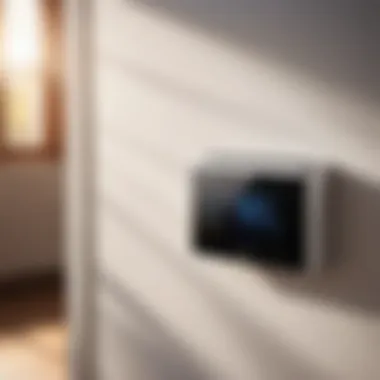Optimizing Bedroom Air Conditioners: Enhancing Comfort and Efficiency


Materials:
- Air conditioner unit suitable for bedroom size (recommended: 8,000 BTU)
- Mounting brackets
- Power drill
- Anchors and screws
- Level
- Insulating foam
- Weatherstripping
- Drip pan and pipe
- Remote control or smart thermostat
DIY Steps:
- Measure and Select: Measure your bedroom size to determine the appropriate BTU rating for the air conditioner. Select a unit with sufficient cooling capacity for optimal performance.
- Preparation: Secure mounting brackets on the window frame using a power drill and anchors. Ensure the brackets are level to support the weight of the air conditioner.
- Insulation: Apply insulating foam around the window opening to prevent air leaks. Use weatherstripping to seal gaps between the window and the air conditioner.
- Installation: Place the air conditioner unit on the mounting brackets and secure it in place. Connect the drip pan and pipe to direct condensation outside.
- Setup and Control: Set up the remote control or smart thermostat for convenient operation. Program temperature settings for personalized comfort.
Technical Aspects:
- Use a power drill with the correct drill bit size for mounting brackets to ensure stability.
- Take care to insulate effectively to maintain energy efficiency and maximize cooling performance.
- Follow the manufacturer's guidelines for installation and operation to prevent damage and optimize longevity.
DIY Project Process:
- Sequential Steps: The installation process should be carried out step by step, starting with preparation and ending with setting up controls to enjoy the cool, comfortable environment.
- Troubleshooting Tips: In case of any issues, check for proper insulation and sealing first. Ensure the drip pan and pipe are correctly installed to prevent leaks or water damage.
Choosing the Right Bedroom Air Conditioner
Considering Room Size and Capacity


Determining the Square Footage of the Bedroom
When it comes to selecting the right air conditioner for your bedroom, one key aspect to consider is the square footage of the room. Determining the exact size of the space allows you to choose an appropriate unit that can efficiently cool the area without overworking the system. By calculating the square footage accurately, you can avoid purchasing an air conditioner that is either too small to cool the room effectively or too large, leading to energy wastage.
Matching the Air Conditioner Capacity to Room Size
Matching the air conditioner capacity to the room size is essential for optimizing performance and energy efficiency. An air conditioner that is too powerful for the space may cool the room quickly but will cycle on and off frequently, leading to increased energy consumption and potential temperature fluctuations. Conversely, an undersized unit will struggle to cool the room adequately, resulting in discomfort. By ensuring the air conditioner's capacity aligns with the room size, you can achieve balanced and efficient cooling.
Types of Air Conditioners
Window AC Units
Window air conditioners are a popular choice for bedrooms due to their ease of installation and cost-effectiveness. These units are typically mounted in a window and provide efficient cooling for individual rooms. While window AC units are known for their convenience and affordability, they may require professional installation for proper sealing and insulation to prevent air leaks.
Portable Air Conditioners
Portable air conditioners offer flexibility and mobility, making them ideal for bedrooms where window installations are not feasible. These units can be moved from room to room as needed and usually come with features such as programmable timers and remote controls for added convenience. However, portable air conditioners may produce more noise compared to other types of units.
Split-System Air Conditioners
Split-system air conditioners consist of two main components: an indoor unit that delivers cool air into the room and an outdoor unit that dissipates heat. This design reduces noise levels inside the bedroom, providing quieter operation for improved comfort during sleep. Split-system air conditioners are known for their energy efficiency, customization options, and ability to cool larger areas effectively.


Energy Efficiency Ratings
Understanding SEER and EER Ratings
SEER (Seasonal Energy Efficiency Ratio) and EER (Energy Efficiency Ratio) ratings are essential factors to consider when evaluating the energy efficiency of an air conditioner. SEER ratings indicate a unit's efficiency over an entire cooling season, while EER ratings measure efficiency at a specific temperature. By understanding these ratings, you can choose an air conditioner that optimizes energy usage and reduces utility costs.
Choosing Energy-Efficient Models
Selecting energy-efficient air conditioner models can lead to long-term savings on energy bills while minimizing your environmental impact. Energy-efficient units utilize advanced technology to deliver cooling performance using less energy, resulting in lower operating costs and reduced carbon emissions. By investing in energy-efficient models, you contribute to sustainability efforts and enjoy ongoing benefits in comfort and efficiency.
Installation and Placement Tips
When it comes to optimizing your bedroom air conditioner for maximum comfort and efficiency, the installation and placement of the unit play a crucial role. Proper installation and placement not only ensure efficient airflow but also contribute significantly to the overall effectiveness of the air conditioner. By focusing on specific elements such as optimal placement for airflow, avoiding obstructions, and sealing and insulation, you can make the most out of your bedroom cooling system.
Optimal Placement for Airflow
Avoiding Obstructions
Avoiding obstructions around your bedroom air conditioner is paramount to maximizing its performance. An unobstructed unit allows for free airflow, preventing any hindrances that could reduce the cooling efficiency. Common obstructions to watch out for include furniture, curtains, or any items that could obstruct the air conditioner's vents. By maintaining clear space around the unit, you ensure that the airflow is unrestricted, leading to better circulation and enhanced comfort in your bedroom.
Directing Airflow Towards the Bed


Directing airflow towards the bed is a key strategy in optimizing the cooling effect of your air conditioner. By positioning the unit strategically to direct airflow towards the bed, you can ensure that you benefit the most from its cooling power. This approach helps in delivering cool air directly to where it is needed most, creating a comfortable sleeping environment. Additionally, directing airflow towards the bed minimizes energy waste by maximizing the effectiveness of the cooling process, thus promoting both comfort and efficiency.
Sealing and Insulation
Proper sealing and insulation are essential aspects to consider when aiming to optimize your bedroom air conditioner. Ensuring proper insulation around the unit aids in maintaining a consistent temperature within the room. This not only enhances the cooling efficiency of the air conditioner but also contributes to energy savings. Sealing gaps to prevent air leakage further enhances the unit's performance by sealing off any areas where cooled air could escape, ensuring that your bedroom stays comfortably cool. By paying attention to these details, you can create an environment that is not only comfortable but also energy-efficient, benefiting both your comfort and your utility bills.
In the realm of bedroom air conditioners, upkeep and cleanliness play a vital role in ensuring optimal performance and longevity. Proper maintenance not only enhances comfort but also contributes to energy efficiency, saving you money in the long run. Regular filter maintenance is a crucial aspect of keeping your air conditioner running smoothly. Cleaning or replacing filters is essential to prevent dust and debris buildup, which can hinder airflow and strain the system. By staying on top of filter maintenance, you ensure that your air conditioner operates at its best capacity, providing consistent cooling without overworking itself.
Maintaining optimal airflow is another key element in the maintenance process. Ensuring that the airflow around the air conditioner is unobstructed and directed correctly helps improve efficiency and overall performance. By keeping the airflow unimpeded, you help the unit cool the room effectively without unnecessary strain. This simple step can have a significant impact on your bedroom's comfort level and the efficiency of your air conditioner.
When it comes to coil cleaning, removing dust and debris from the coils is essential for maintaining cooling efficiency. Over time, particles can accumulate on the coils, reducing their ability to transfer heat effectively. By regularly cleaning the coils, you not only ensure proper cooling but also extend the lifespan of your air conditioner. Enhancing cooling efficiency through coil maintenance is a straightforward yet crucial step in optimizing the performance of your bedroom air conditioner.
Professional maintenance offers various benefits that go beyond DIY upkeep. Ensuring peak performance through professional service helps address any underlying issues and fine-tune your air conditioner for optimal operation. Professionals can also detect potential problems early, preventing costly repairs down the line. Extending the lifespan of the air conditioner is another advantage of professional maintenance. By addressing wear and tear proactively, you enhance the longevity of your unit, maximizing your investment in comfort. Professional maintenance is a worthwhile investment that can not only save you money in the long term but also ensure that your bedroom remains a comfortable sanctuary year-round.
Optimize Energy Efficiency
Why Optimizing Energy Efficiency Matters
Smart Thermostat Integration
Programming Temperature Settings
Programming temperature settings plays a critical role in optimizing energy efficiency for bedroom air conditioners. By customizing temperature profiles based on your daily routine and preferences, smart thermostats ensure that your bedroom remains comfortable while minimizing energy wastage. This feature allows you to set lower temperatures when you are asleep or away from home and raise them when you are awake, leading to significant energy savings over time. Programmable temperature settings are a popular and beneficial choice for enhancing energy efficiency, offering precise control and automation for a more eco-friendly cooling experience.
Utilizing Energy-Saving Modes
Incorporating energy-saving modes into your air conditioning system is a smart strategy to improve overall energy efficiency. Energy-saving modes optimize cooling performance by adjusting temperature settings based on occupancy and environmental conditions. These modes may include features like adapting to outdoor temperature changes, utilizing sensors to detect room occupancy, and adjusting fan speeds for optimal efficiency. By activating energy-saving modes, you can reduce energy consumption without compromising comfort, making it a practical choice for maximizing energy efficiency in your bedroom environment.







